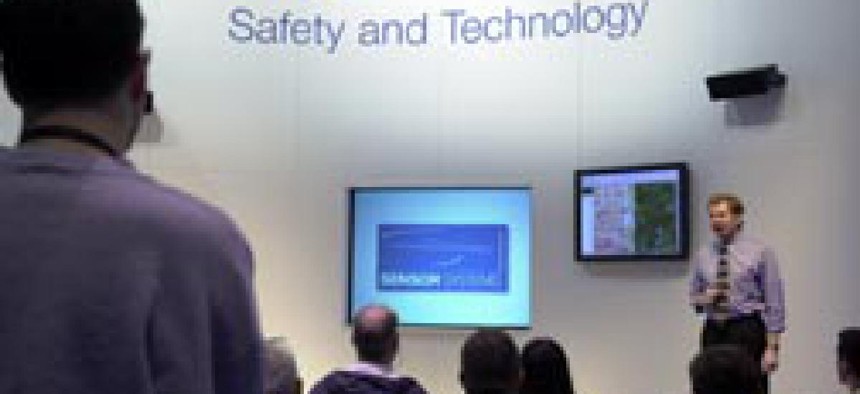Sales pitches change as agencies seek solutions

Government agencies are approaching IT problems more like businesses and, as a result, companies are sharpening their pitches to highlight solutions rather than products, according to vendors at FOSE 2002. "We're going more towards the solutions and partnership approach," said Bruce Klein of Hewlett-Packard Co.
"Solutions" was part of everybody's sales pitch at the FOSE 2002 trade show March 20. Government agencies are approaching information technology problems more like businesses and, as a result, companies are sharpening their pitches to highlight solutions rather than products, vendors said. "We're going more towards the solutions and partnership approach," said Bruce Klein, national federal sales manager for Hewlett-Packard Co., Palo Alto, Calif. "The public-sector attitude is becoming more closely aligned with the approach we've always seen with business."Corporations will approach an IT company and say, solve this problem. This is now something Hewlett-Packard is seeing with government agencies, Klein said.The upshot is vendors must now form more partnerships, said Michael Sledge, vice president for federal, civil, state and local agencies for consultant Robbins Gioia, LLC, Alexandria Va.For example, Hewlett-Packard is doing a project with Oracle Corp., Redmond Shores, Calif., to install a unified financial system for the National Guard units in all 50 states, Klein said. Hewlett-Packard also partnered with Lockheed Martin Corp., Bethesda, Md., to provide servers for its Tomahawk missile contract. That contract, awarded in January, is worth $20 million to Hewlett-Packard.Klein said the partner and solution approach is paying off. The federal unit of Hewlett-Packard has enjoyed 20 percent growth in the first quarter of the company's fiscal 2002, which ended in January.Jim Shanks, president of CDW-Government, a subsidiary of CDW Computer Centers Inc., Vernon Hills, Ill., said his company is seeing more solutions-oriented sales as well. Larger purchases such as enterprisewide license agreements are getting a lot of play, and the sales team has been more focused on solving problems."The government offices are learning how to leverage their purchasing power," Shanks said. Oracle is emphasizing its consulting services and the increased functionality of its product line. Since Sept. 11, Oracle has opened a homeland security initiative that offers a portal application to allow individuals to collaborate on projects online. "Secure collaboration is what we're really focused on," said Steve Cooperman, director of Oracle Homeland Security Initiative.On March 5, the company announced a partnership with PricewaterhouseCoopers LLP, New York; Electronic Data Systems Corp., Plano, Texas; Sun Microsystems Inc., Palo Alto, Calif.; and Identix Inc., Los Gatos, Calif.; to build security applications for airports.According to Cooperman, Oracle also is increasing its marketing emphasis on helping government better use its Oracle databases. "In a lot of cases, the functionality is already in the installations," Cooperman said.To this end, Oracle is providing the consulting to help the database meet new intra-agency requirements.Other companies are seeing other requirements from the government. The chief selling point for FrontRange Solutions, Colorado Springs, Co., a vendor of the Goldmine customer relations management software, has been time to implementation, said Chris Behrens, federal sales executive for the company."An office may spend a lot of time writing the solicitation, but when it places the order, it wants to see results fast," he said.Overall, Behrens said, the government is in the mode doing more with less, meaning stretching the IT budget. Chris Hassler of the contract and systems engineering consultants SM&A, Herndon, Va., said he predicted that as the government moves toward off-the-shelf equipment, "agencies will have to refresh contracts more frequently to stay abreast." Hassler prepared a presentation for FOSE entitled, "Why Incumbents Lose."Hassler said he is seeing a shift in government solicitations. Bidders will have to start thinking more creatively about what it will take to address agency needs as they become more focused on performance, he said.


Exhibitors offer their wares to the federal government at FOSE 2002 in Washington. (Photo by Henrik G. de Gyor)
NEXT STORY: Qwest, Loudcloud score Freddie Mac Web services